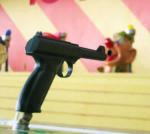What’s your story?
Share and find customer experiences
Connect with the people behind them
Wacktrap is
feedback made social
Trending Content
Customs Officials Celebrate Bribes Russian Corruption in Rap Video Bragging on Bribery
by hearit
Russian Prime Minister Putin is criticizing a group of customs officers for a YouTube video that celebrates the lavish lifestyle they lead – with other people’s money, called bribes. While Putin criticizes, his words aren't so harsh -- since Putin seems to have a bit of that corruption, or a billion of it, on his side too.
Russian customs officials have newly-released their own version of a rap video, which includes scenes straight from the Pacific port city of Vladivostok. The government officials seem to be enjoying a very lavish lifestyle indeed. Certainly no one’s arguing that the “rap” video’s artistic – but the Russian video and its content is certainly controversial.
All rap videos seem to have a common denominator: money. U.S. rap artists openly brag about, rap about, and show off their acquired “bling.” While ridiculous, the money aspect is about cash they’ve earned and showing just how rich they’ve become. The young, Russian customs officials in their rap video also focus on riches and what those riches have brought them: women, expensive sunglasses and clothes, a Rolls Royce and expensive champagne. It all adds up to money – but in Russia, they’re talking about stolen money. Specifically, bribes.
And it seems those customs officials want the world to know it – via YouTube.
For those who care (or who can bear) to listen, singing Russian customs officers sing bragging lyrics: "You can't even imagine how the customs officials have fun." The chorus is accompanied by a topless woman, hugging customs forms to her naked chest.
Despite how bad the customs officers’ video makes the Russian government look to outsiders, Putin’s taken no disciplinary action against the customs officers who mock the bribe-taking government. Putin’s comment on Russian corruption is: "Discipline is needed in several of the divisions, we have to raise it a little," Putin allegedly told the Federal Customs Service.
Raise it “just a little” – but not too much. Putin knows better than to stifle too much of the bribe-taking activity, or he may just find himself under fire for his own alleged actions of building a lavish palace with a one billion dollar associated cost.
The average monthly salary for customs officials in Russia is about a grand — but monthly salary is known to be “subsidized” with bribes – with $1,000 is said to be the amount of the average Russian bribe. Russia’s public expects paying bribes as a part of regular living, for even basic, standard procedure that affect virtually every aspect of life: receipt of health care, evading traffic penalties with police, and even receiving better grades in higher education or at universities.
Unfortunately, Russia’s government is said to be corrupt to the core, with
bribe-taking by government officials and within the government’s customs service, a standard practice. For businesses, corruption is considered the biggest blockade for advancement and function, requiring even larger-than-normal bribes in order for companies to secure contracts or business within Russia.
.
“Transparency International” ranks Russia as among the most corrupt in government rankings, the country ranking 154th out of 178 countries in a corruption perception index. Basically, Russia’s corruption perception is considered to be on par with the countries of Laos and Cambodia.
Government jobs are among the most sought-after in Russia, the cushy and potentially lucrative positions sold for thousands of dollars in Russia. Bureaucrats are able to to supplement modest incomes with big bribes.
The Pacific port city of Vladivostok, scene of the customs officers’ on-site “rap” video serves as a specific Russian port where goods aplenty arrive directly from China. As one Russian citizen puts it, “They [Vladivostok port customs officials] are literally raking in the money.”
Russia’s President Dmitry Medvedev has just sent a bill to parliament – to increase fines for government officials who are caught taking bribes, though the move is a bit ironic. Supposedly, the new bill means that Russian government officials -- who are caught taking bribes -- will be subject to a fine that is up to 100 times the size of the original bribe accepted.
The irony, of course, is exactly how effective the government will be in attempting to ban corruption within its own walls – or how corrupt government officials will be, in attempts to ban corruption. Where bribes are commonplace, it’s probably not too likely that Russia will actually charge its own government officials with the misdeed.
In the meantime, Putin might consider finding a way to ‘reign in,’ or tone down his country’s customs officials – a group of young men whom are obviously fans of the commonplace government bribes that support their rich lifestyles. In fact, Putin needs to find a way to tone down any flashing of a lavish lifestyle supported by bribe-taking, or he’ll find himself under even more criticism shortly.
Recent allegations claim that Vladimir Putin has built a lavish £600 million Italianate palace near a Black Sea resort, using financial means that a Russian businessman alleges are proceeds of "corruption, bribery and theft.”
Located on prime land near the Black Sea coast, the property that Putin is purported to own maintains its own vineyard and helipad. The palace size is reported to be almost eight million square feet and amendments said to include an indoor cinema, a summer amphitheatre, casino, pools, gym, and even a clock tower. Sergei Kolesnikov, the businessman making the claim against Putin, says the building is similar to a palace built for Russia's Tsars outside St Petersburg -- and that the Russian prime minister personally approved the design and materials for the lavish structure
.
Says Kolesnikov in a letter to President Medvedev: "A palace is being built on the Black Sea coast for the personal use of the Russian prime minister [Vladimir Putin]…As things stand, the cost of the palace is $1 billion. The funds were mostly raised through a combination of corruption, bribery and theft.”
Kolesnikov says that a state construction company was used to build the Russian palace he claims is for Putin, and that state funds had been illegally diverted to the Italianate palace project meant for Putin.
"Corrupt officials building themselves personal palaces at a time when children are dying due to lack of funds for medicines is Russia's shame," writes Kolesnikov. Russian magazine Kommersant Dengi, reported last month that Putin and Medvedev share at least twenty-four palaces, villas and mansions between the two Russian government officials.
The official income declaration for Putin’s 2010 earnings puts in a claim of earnings equivalent to only about £80,000 – despite allegations of Putin’s ownership or sharing of 24 properties and palaces, and his alleged one billion dollar cost in building the most recent Black Sea palace location.
Kolesnikov is calling on Russian President Medvedev because, he says, it is within the President’s powers to show ordinary Russians that everyone stands equal before the law -- including Mr Putin.
It’s not looking like that anti-bribery bill, sent to Russian Parliament, is going to be working out quite so well, in helping to cease government corruption.
Location
SPEED UP YOUR ONLINE GROWTH
How To Wack
Take the Tour
Click on any image to start











